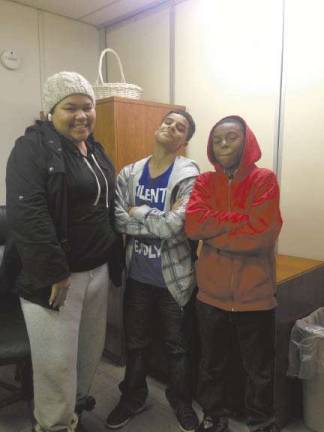Looking for Answers On the L.E.S.

A spate of teen-focused violence has rattled the neighborhood
After what has been a violent year on the Lower East Side ? including the shooting deaths of two teenagers -- police, after-school programs, and members of the community are working to bring peace to the neighborhood.
A lot of that effort has centered around after-school safe havens like Boys and Girls Republic and the Grand Street Settlement, which have become hangouts for teenagers from the Jacob Riis and Baruch housing developments.
Nichole Fernandez, 18, who goes to James Baldwin High School and works at Grand Street, knew Raphael Ward, the 16-year-old who was killed in January outside of the DeWitt Reformed Church. Fernandez is looking to go to college, and dreams of becoming either a pediatrician or a nurse.
She looks out for kids like Abdul Wahab, an energetic seventh-grader at PS 140, who loves to crack jokes and wants to be a pharmacist when he grows up. He goes to Grand Street Settlement and school with his friend Farkon James, who always reminds people that the "k" in his name is silent. Farkon is a little bit more shy than his friend, but says that he loves to play basketball and football, and wants to become an FBI agent.
"I see a lot of kids on the street either doing drugs or fighting, but at Grand Street, it's safe," said Farkon.
For them, it's all about keeping off the streets. Grand Street and Boys and Girls Republic, part of the Henry Street Settlement, fill kids' after-school schedules with homework, sports and pizza parties. At Boys and Girls' Republic, they even create their own mini city government, complete with city council members who pass bills and a mayoral debate on the same night as the city mayoral debate.
"I think community centers are mostly a way to keep children out of trouble," said Nichole, who grew up at Grand Street. If there were more people involved, then we could have less trouble on the streets."
As for the gun violence, Nichole seemed to think it was more complicated than good guys versus bad guys, or gangs and drugs poisoning a neighborhood. She explained that there really aren't gangs in the neighborhood that she knows of, just some intense cliques and rivalries. With a slight crack in her voice, Nichole explained that she knew Raphael, who was killed in January, and had attended Grand Street.
"I couldn't believe it was him until I saw pictures of him on the news and thought, 'wow stuff like that can happen to anyone,'" said Nichole. "A bullet doesn't have a name on it."
After the shootings, Nichole, Abdul and Farkon's parents were nervous about letting them out of the house.
"My mom was all the time calling me like, 'where are you at?' just the fact I knew the kid that got killed, she wanted me home all the time," said Nichole.
And even though they all come from different backgrounds, and are of different races, all three youths agreed on one thing: they aren't too keen on the media or the cops. The media, they say, over-exaggerates the danger in their neighborhood. And the cops see suspicion everywhere in the kids that stream in and out of the rows of dark brick housing complexes.
"We don't like cops," they practically say in unison. Abdul cautiously recollected the story of the first time he was ever approached by the cops on the Lower East Side. He was six years old.
"I was with my older brother and we saw two cops coming and they were walking like they were drunk or something, so we crossed the street and they said, 'What, do you have a problem with us?'" said Abdul. "They took their nightsticks and made us get on the ground."
Nichole recalled an incident where she was visiting a friend's apartment and passing cops thought she was trying to break in.
But even after talking for awhile about heavy subjects ranging from racial profiling to violence and street smarts, they eventually grew tired, and started asking about their promised buffalo wings before they went home for the day, and posing with their hoodies, trying to look tough, but cracking a smile, in spite of themselves.